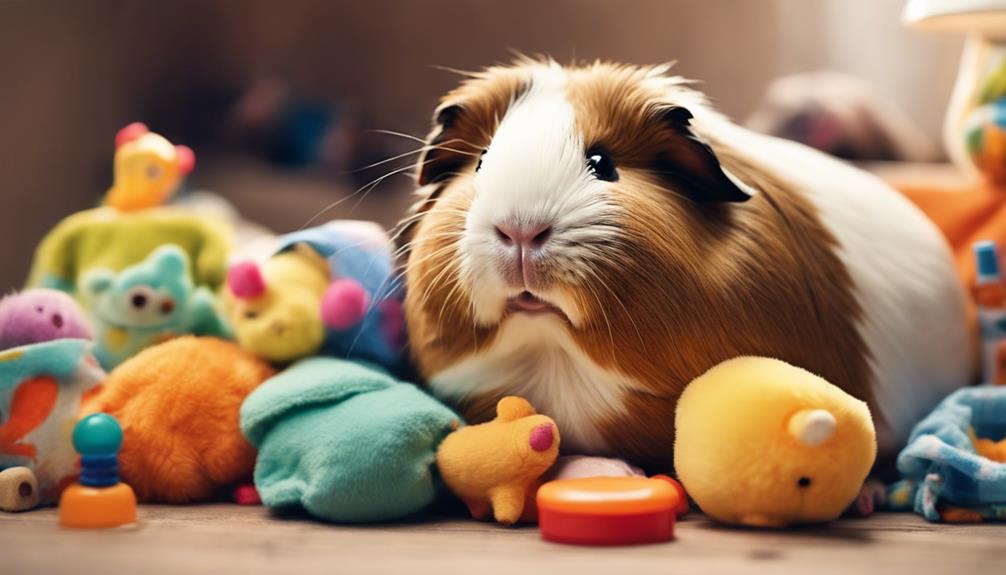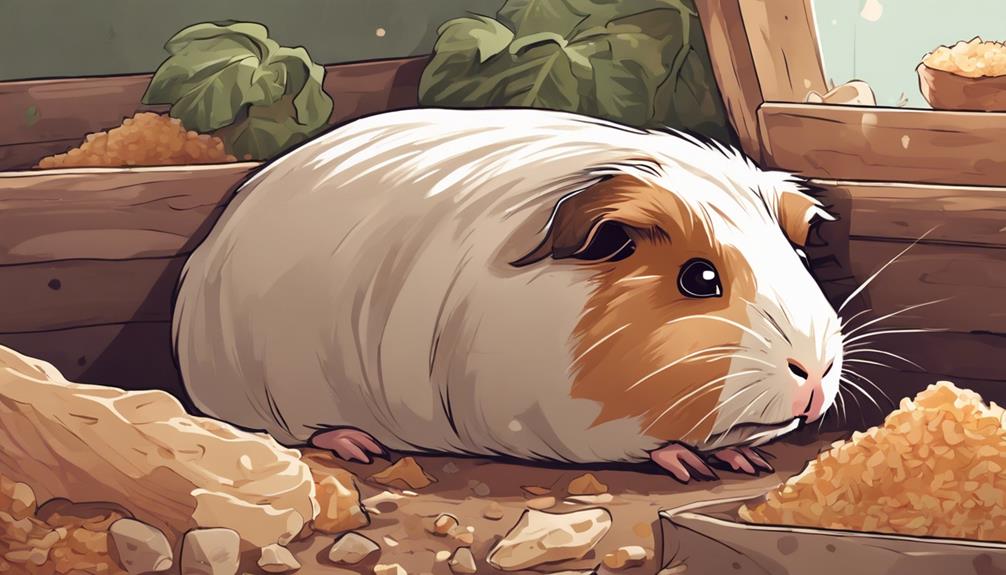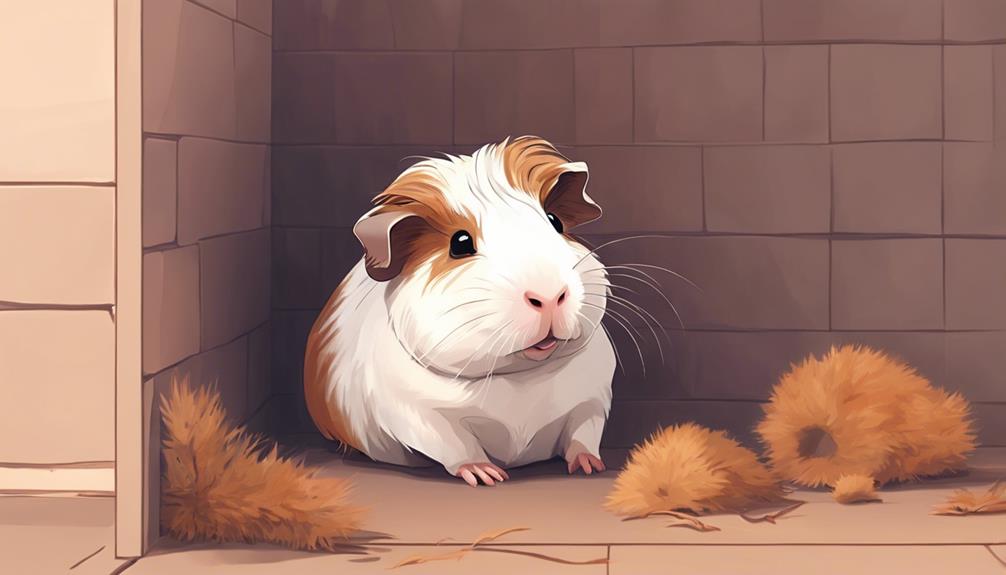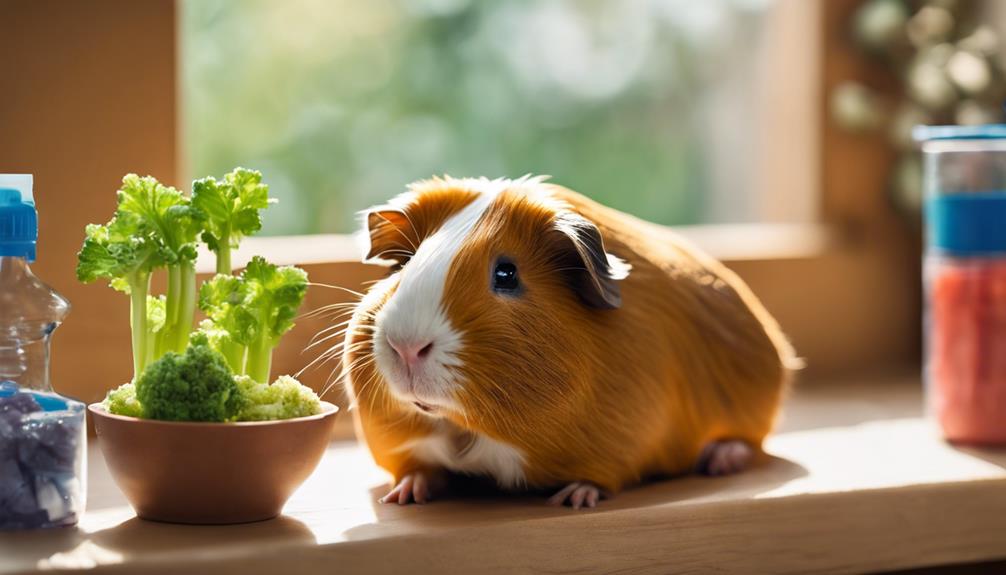Do Guinea Pigs Hide Their Illnesses? Insights Into Their Behavior

Guinea pigs are prey animals, and in the wild, showing signs of weakness can make them vulnerable to predators. Therefore, they have evolved to hide their illnesses as a survival instinct.
This means that guinea pigs may not show obvious symptoms of being sick until they are quite ill. It is crucial for guinea pig owners to be vigilant in observing their pets for any subtle changes in behavior or appearance that could indicate an underlying health issue.
Regular health checks and prompt veterinary care are essential to ensure the well-being of guinea pigs.
Key Takeaways
- Guinea pigs may hide illnesses due to survival instincts.
- Changes in behavior and communication signal underlying health issues.
- Early detection through observation and veterinary care is crucial.
- Understanding guinea pig behavior aids in timely intervention for their well-being.
Understanding Guinea Pig Behavior
To truly comprehend guinea pig behavior, one must observe their interactions within their environment and decode the subtle cues they exhibit through body language and vocalizations. Understanding communication is crucial in deciphering the intricate social interactions of these delightful creatures. Guinea pigs are highly social animals that rely on a complex system of sounds, movements, and gestures to convey their feelings and intentions to one another.
Within a group of guinea pigs, communication plays a crucial role in establishing hierarchies, bonding, and resolving conflicts. By paying close attention to their behaviors, such as chirping, purring, teeth chattering, and rumbling, one can gain valuable insights into the dynamics of their social structure. Additionally, observing how guinea pigs interact through activities like grooming, chasing, and huddling together provides a glimpse into their emotional connections and overall well-being.
Signs of Illness in Guinea Pigs
Observing a guinea pig for signs of illness requires keen attention to both behavioral shifts and physical symptoms. Changes in eating habits, activity levels, or vocalizations can be early indicators of underlying health issues.
It's paramount to promptly seek veterinary care if any concerning signs manifest in a guinea pig's behavior or well-being.
Behavioral Changes Indicating Illness
What subtle behavioral changes in guinea pigs could be early indicators of illness? Guinea pigs, known for their illness concealment and silent suffering, may exhibit hidden distress through subtle clues in their behavior. Here are three key behavioral changes to watch for:
- Altered Eating Habits: A sudden decrease in appetite or refusal to eat favorite foods could signal an underlying health issue.
- Unusual Lethargy: If a typically active guinea pig becomes lethargic, spending more time huddled in a corner or showing disinterest in playtime, it may indicate illness.
- Changes in Grooming: A guinea pig that stops grooming itself adequately or shows a decline in personal hygiene might be experiencing discomfort or pain.
Monitoring these behavioral changes can help detect illness early, ensuring timely care and attention for these beloved pets.
Physical Symptoms to Watch
Subtle changes in guinea pig behavior can often be the first indicators of underlying health issues, yet paying attention to physical symptoms is equally important in monitoring their well-being. Recognizing early, subtle signs of illness is paramount for proactive care. Watch for changes in appetite, weight loss, abnormal stools, lethargy, or excessive sneezing. Any alterations in fur quality, such as matting or thinning, may also signal a health concern.
Monitor closely for signs of eye or nose discharge, as well as crusty eyes, which could indicate an infection. Additionally, observe for overgrown teeth, as this can lead to eating difficulties. By keenly observing these physical symptoms, caregivers can promptly seek veterinary care, ensuring the well-being of their beloved guinea pigs.
Seeking Veterinary Care
To guarantee the prompt and proper care of guinea pigs, recognizing early signs of illness and promptly seeking veterinary attention are paramount steps in maintaining their health and well-being.
Here are three essential aspects to keep in mind when it comes to seeking veterinary care for guinea pigs:
- Preventive care: Regular check-ups and consultations with a specialized veterinarian can help detect underlying health issues before they escalate.
- Observant behavior: Being attentive to any changes in your guinea pig's behavior, eating habits, or activity levels can aid in identifying potential health concerns early on.
- Timely veterinary visits: Acting swiftly upon noticing any signs of illness and scheduling prompt veterinary appointments can greatly improve the chances of successful treatment and recovery for your beloved guinea pig.
Instincts to Conceal Weakness
Intriguingly, do guinea pigs possess an innate inclination to conceal any signs of weakness they may exhibit? Guinea pigs, known for their gentle nature, indeed have evolved concealment tactics as part of their survival instincts. These small animals, often prey in the wild, have developed mechanisms for masking vulnerability and camouflaging distress.
When feeling unwell, guinea pigs may exhibit subtle changes in behavior, such as reduced activity or decreased appetite, which can be easy to overlook. By concealing their symptoms, they may avoid drawing attention to themselves, a behavior deeply rooted in their instinctual response to threats in their environment.
Understanding these tendencies is essential for guinea pig owners, as it highlights the importance of keen observation and regular health monitoring. By being attuned to the subtle signs of distress that guinea pigs may exhibit, caregivers can provide timely intervention and guarantee the well-being of these beloved pets. Remember, guinea pigs rely on us for their care and protection, making it vital to be vigilant and proactive in addressing any indications of potential illness.
Stress and Its Impact

Stress can greatly influence the behavior of guinea pigs, prompting noticeable changes in their actions and reactions. These alterations can extend beyond mere behavioral shifts, impacting the overall health and well-being of the animals.
Understanding how stress manifests in guinea pigs is important in ensuring their welfare and addressing any potential health consequences.
Stress in Guinea Pigs
Amidst the intricate dynamics of guinea pig behavior, the manifestation of stress reveals profound insights into their well-being and resilience. Understanding stress in guinea pigs is essential for their overall health and happiness. Here are three key aspects to take into account:
- Environmental Factors: Changes in their surroundings like loud noises or sudden movements can trigger stress responses in guinea pigs.
- Social Interaction: Lack of companionship or aggressive behavior from cage mates can lead to heightened stress levels in these social animals.
- Physical Health: Underlying health issues, improper diet, or inadequate living conditions can contribute to stress in guinea pigs, affecting their well-being.
Behavioral Changes
During periods of heightened stress, guinea pigs exhibit distinct behavioral changes that offer valuable insights into their emotional well-being and adaptability. These behavioral cues can provide important indicators of underlying illness. When under stress, guinea pigs may show signs of concealment, attempting to mask symptoms of sickness as a survival instinct. They might withdraw, become less active, or exhibit changes in eating habits.
Recognizing these behavioral shifts is vital for caretakers to promptly address any potential health issues. By closely observing and understanding these changes, individuals can guarantee the well-being of their guinea pigs and provide necessary care and support during challenging times. Monitoring their behavior with attentiveness and compassion is key to maintaining their health and happiness.
Health Consequences
In times of heightened stress, guinea pigs may experience significant health consequences that can impact their overall well-being and resilience.
- Physical Manifestations: Stress in guinea pigs can lead to a weakened immune system, making them more susceptible to illnesses and infections.
- Digestive Issues: Increased stress levels can disrupt their digestive system, leading to symptoms like diarrhea or decreased appetite.
- Behavioral Changes: Stress can manifest in various behavioral clues such as increased aggression, excessive grooming, or hiding, which serve as important health indicators for guinea pig owners to observe.
Importance of Observation

Observation plays a significant role in gaining insights into guinea pig behavior, guiding owners to understand their pets' needs and preferences more effectively. By closely observing their guinea pigs, owners can detect early signs of illness, allowing for prompt intervention and treatment. Behavioral cues are often subtle but can serve as warning signs that something may be wrong with the pet. Here is a table summarizing some common behavioral changes that might indicate a health issue in guinea pigs:
| Warning Signs | Description |
|---|---|
| Decreased appetite | Loss of interest in food |
| Lethargy | Unusual lack of energy |
| Hiding behavior | Avoiding interaction |
| Changes in vocalization | Altered squeaking or purring |
Seeking Veterinary Care
To guarantee the well-being of their guinea pigs, responsible owners should promptly seek veterinary care upon noticing any concerning behavioral changes. Early detection and preventative care are paramount in maintaining the health of these delicate pets. Here are three important steps to contemplate when seeking veterinary care for a guinea pig:
- Immediate Action: Owners must act swiftly when they observe any deviations from their guinea pig's normal behavior. Any signs of lethargy, decreased appetite, or abnormal discharge shouldn't be ignored, as they could indicate underlying health issues requiring professional attention.
- Clear Communication: When consulting a veterinarian, clear and detailed communication about the observed symptoms is essential. Providing a thorough history of the guinea pig's behavior, diet, and living conditions can aid in the accurate diagnosis and treatment of any potential illnesses.
- Building Trust: Developing a trusting relationship with a knowledgeable veterinarian is essential for the long-term care of guinea pigs. Regular check-ups, open communication, and following medical advice diligently are crucial components of maintaining the health and happiness of these beloved pets.
Creating a Supportive Environment

Owners who prioritize their guinea pigs' well-being must guarantee that the environment in which these delicate pets reside is supportive and conducive to their health and happiness. Creating a supportive environment involves more than just providing food and shelter; it requires engaging in supportive interactions and establishing comforting routines that cater to the unique needs of guinea pigs.
Supportive interactions play an important role in the well-being of guinea pigs. Spending quality time with them, talking to them softly, and gently petting them can help build trust and strengthen the bond between pet and owner. These interactions provide emotional support to guinea pigs, making them feel secure and loved in their environment.
Establishing comforting routines is equally important. Guinea pigs thrive on consistency, so maintaining a regular schedule for feeding, cleaning, and playtime can help reduce stress and anxiety. Providing a safe and enriching living space, complete with hiding spots, toys, and fresh bedding, contributes to a sense of security and comfort for these small animals. By prioritizing supportive interactions and comforting routines, owners can create an environment where their guinea pigs can flourish both physically and emotionally.
Promoting Guinea Pig Wellness
In promoting guinea pig wellness, ensuring a balanced diet tailored to their nutritional needs is essential for their overall health and vitality. Understanding the intricacies of their behavior patterns and communication cues is also vital in providing complete care. To promote the wellness of these beloved pets, consider the following wellness tips and preventive care measures:
- Nutrient-Rich Diet: Offer a variety of fresh vegetables such as bell peppers, kale, and cilantro to meet their vitamin C requirements. Supplement this with high-quality guinea pig pellets to ensure a well-rounded diet.
- Regular Veterinary Check-ups: Schedule routine visits with a knowledgeable exotic animal veterinarian to monitor their health status and address any concerns promptly.
- Enrichment Activities: Stimulate their mental and physical well-being by providing toys, tunnels, and opportunities for exercise outside their enclosure. This engagement can prevent boredom and promote a happy, healthy guinea pig.
Frequently Asked Questions
Can Guinea Pigs Develop Emotional Stress From Concealing Their Illnesses?
Guinea pigs can develop emotional stress from concealing illnesses. This can impact their emotional well-being and physical health. Observing stress management and communication cues is vital in recognizing their needs and ensuring their overall well-being.
How Can Owners Differentiate Between Regular Hiding Behavior and Hiding Due to Illness in Guinea Pigs?
In interpreting guinea pigs' behavior, owners must discern between regular hiding and signs of illness. It's their responsibility to monitor health diligently. Detecting subtle changes promptly can aid in early intervention and guarantee their pet's well-being.
Are There Any Specific Behaviors or Signs That Indicate a Guinea Pig Is Feeling Stressed?
When observing guinea pigs, stress indicators like decreased appetite, excessive hiding, and aggressive behavior can signal distress. Paying attention to these behavioral changes allows owners to intervene promptly, ensuring their pets' well-being.
What Are Some Ways to Help Guinea Pigs Feel More Comfortable and Less Stressed in Their Environment?
To help guinea pigs feel more comfortable and less stressed, creating a calming environment with cozy bedding, proper ventilation, and soft lighting is essential. Socialization techniques like gentle handling and providing companionship can also promote their well-being.
How Often Should Owners Observe Their Guinea Pigs for Signs of Illness or Distress?
Owners should observe their guinea pigs daily for signs of illness or distress. Regular health monitoring is essential, as these small creatures may hide symptoms. Behavioral changes like reduced activity or appetite can signal underlying issues requiring prompt attention.











